The 6 best AI chatbots for business in 2026

Kenneth Pangan
Last edited January 16, 2026
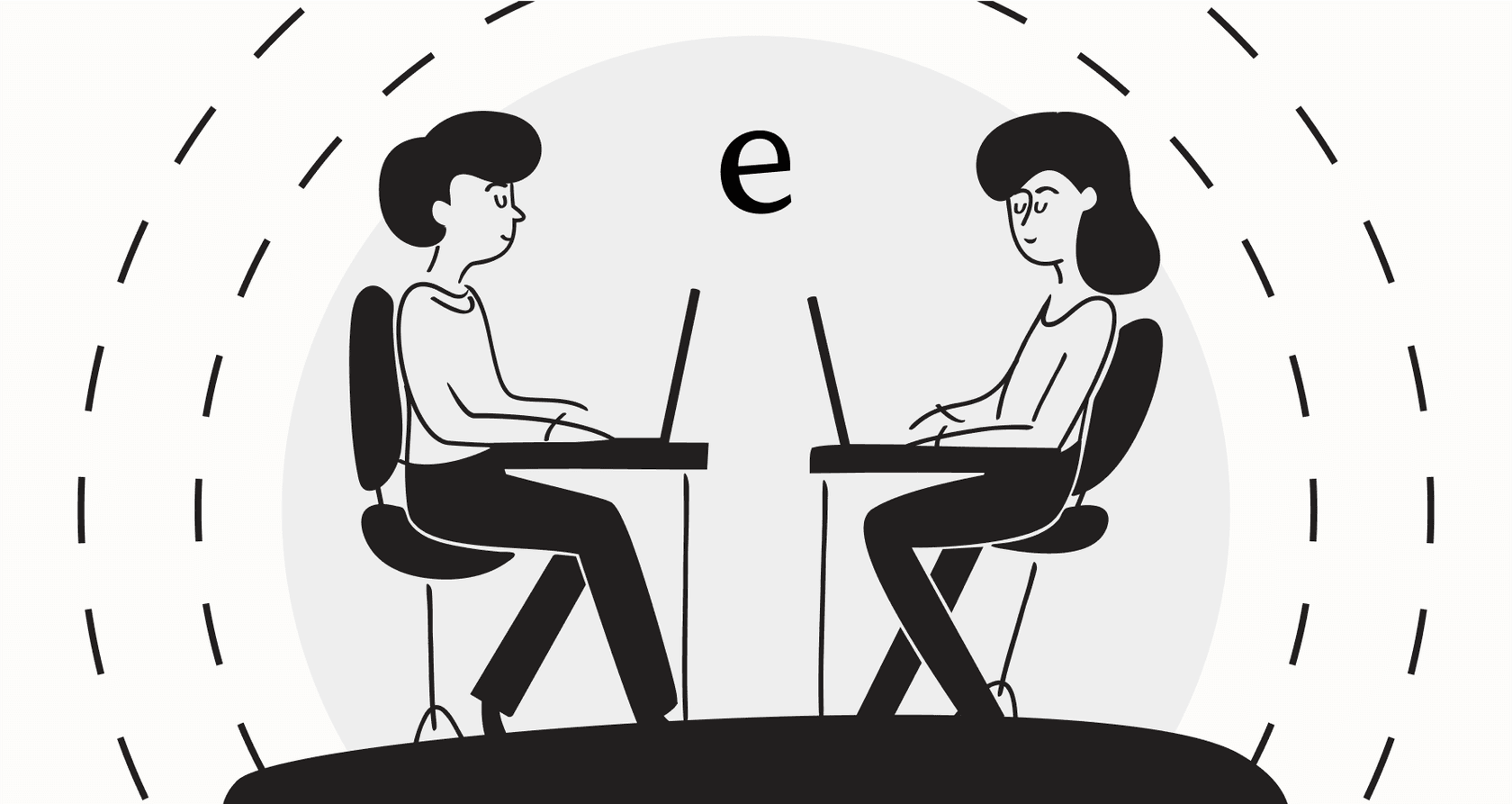
The AI chatbot market is getting pretty crowded, and let’s be honest, it’s tough to sort out the real tools from the hype. A lot of platforms say they’ll fix everything, but their “fix” often means you have to get rid of the helpdesk and other tools your team already uses every day. So how do you find a chatbot that actually makes your current setup better, instead of forcing you into a massive switch?
This guide is here to help with that. We’ve looked at the best AI chatbots for businesses in 2026, paying close attention to features that actually work, smooth integrations, and what they offer in the real world. We’ll walk you through the tools that can truly help automate tasks and support your team without making you rebuild your entire workflow.
What are the best AI chatbots?
In a business setting, an AI chatbot is a tool that uses artificial intelligence (specifically Natural Language Processing, or NLP) to have human-like conversations. Think of them as a massive upgrade from the old, rule-based bots that would get stuck if you didn't type the exact right keyword. These modern bots actually understand what a user is trying to say.
They learn from past conversations and can tackle tricky questions across different channels, whether it's on your website, in a Slack channel, or right inside your helpdesk. The real point is to take repetitive work off your team's plate, answer questions instantly, and free up your people to handle the issues that really need a human touch.
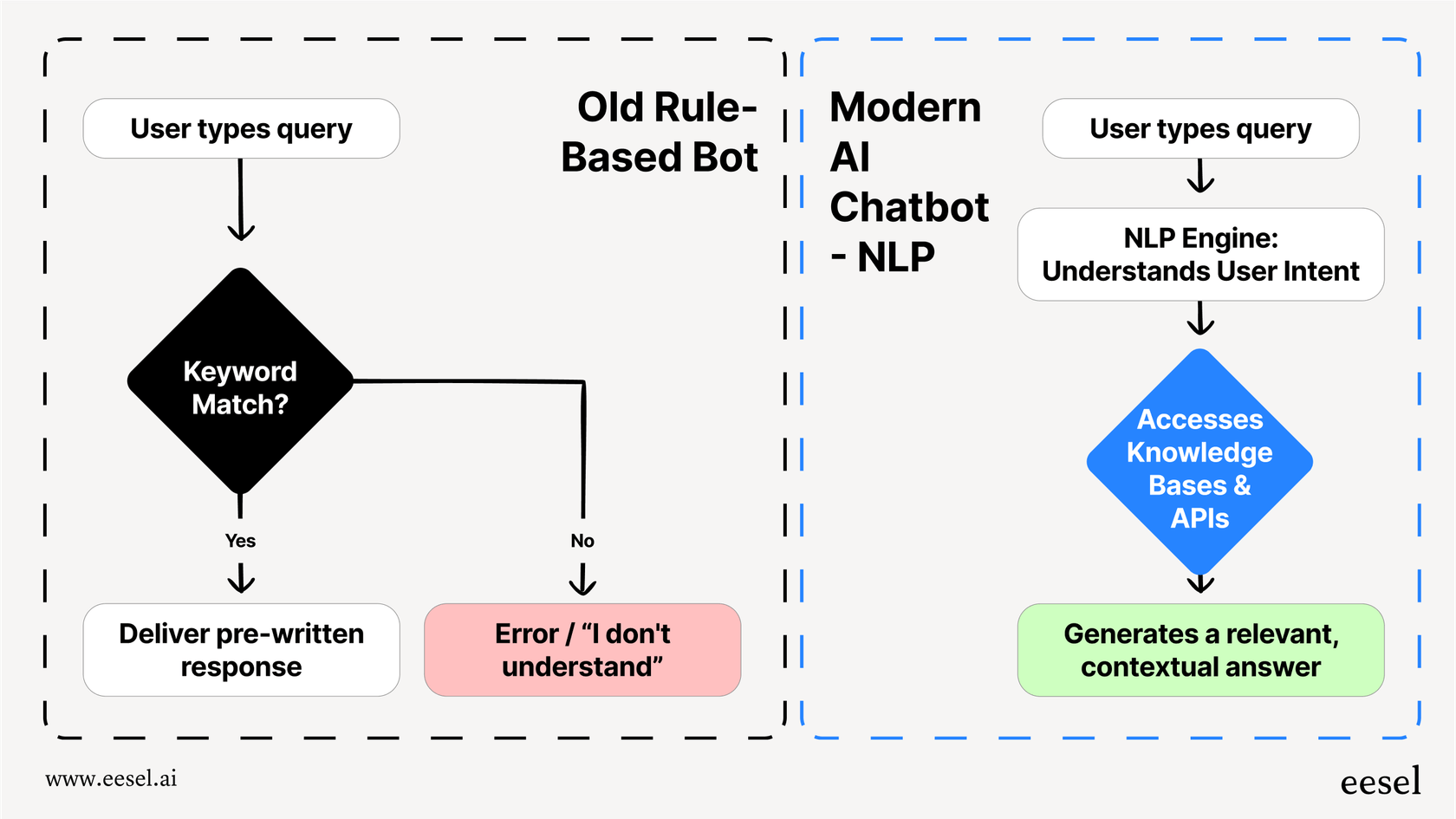
How we picked the best AI chatbots
To put together a list you can actually use, we went beyond the marketing fluff. We judged each chatbot on a clear set of things that matter to today's support, IT, and sales teams.
Here’s what we focused on:
- Real integrations. We looked for bots that play well with the helpdesks, CRMs, and knowledge bases you already have. The goal is to boost your current tools, not replace them.
- AI that does more than talk. Can the chatbot just answer simple questions, or can it actually do things? We wanted to see bots that could sort tickets, suggest replies for agents, and handle tasks on their own.
- Simple setup and use. We picked tools that you can get running without needing a developer. Platforms with no-code builders and straightforward controls got extra points.
- Built for business. Is it a general AI, or was it designed with specific business jobs in mind, like customer service or IT support? We looked for tools built for the job.
- Fair pricing and room to grow. Does the cost make sense as your company gets bigger? We looked for plans that scale with you and can handle more work over time.
The best AI chatbots at a glance
| Tool | Best For | Pricing Starts From | Standout Feature |
|---|---|---|---|
| eesel AI | Improving the tools you already have | $239/month (annual) | Works on top of your current helpdesk & Slack |
| Zendesk AI | Teams already using the Zendesk ecosystem | $55/user/month (Suite Team) | Deep integration with Zendesk Agent Workspace |
| HubSpot chatbot | Automating sales and marketing tasks | Tiered pricing options | Native connection to HubSpot Smart CRM |
| Claude | General creative and analytical jobs | $20/month (Pro) | Large context window and strong reasoning |
| ChatGPT | Versatile content writing and research | $20/month (Plus) | Powerful models and a huge feature set |
| Tidio | Small e-commerce websites | $24.17/month | Lyro AI and sales-focused flows |
A deep dive into the 6 best AI chatbots for 2026
Here’s our breakdown of the top AI chatbots, starting with a flexible option for businesses that want to improve, not replace, their current software.
1. eesel AI
eesel AI is an AI platform designed to work with the tools you already have. It adds a layer on top of your helpdesk (like Zendesk or Freshdesk), internal chat (like Slack), and knowledge sources (like Confluence, Google Docs, and past tickets). This "bring your own helpdesk" setup makes it a great choice for teams who want powerful AI without a painful migration process.
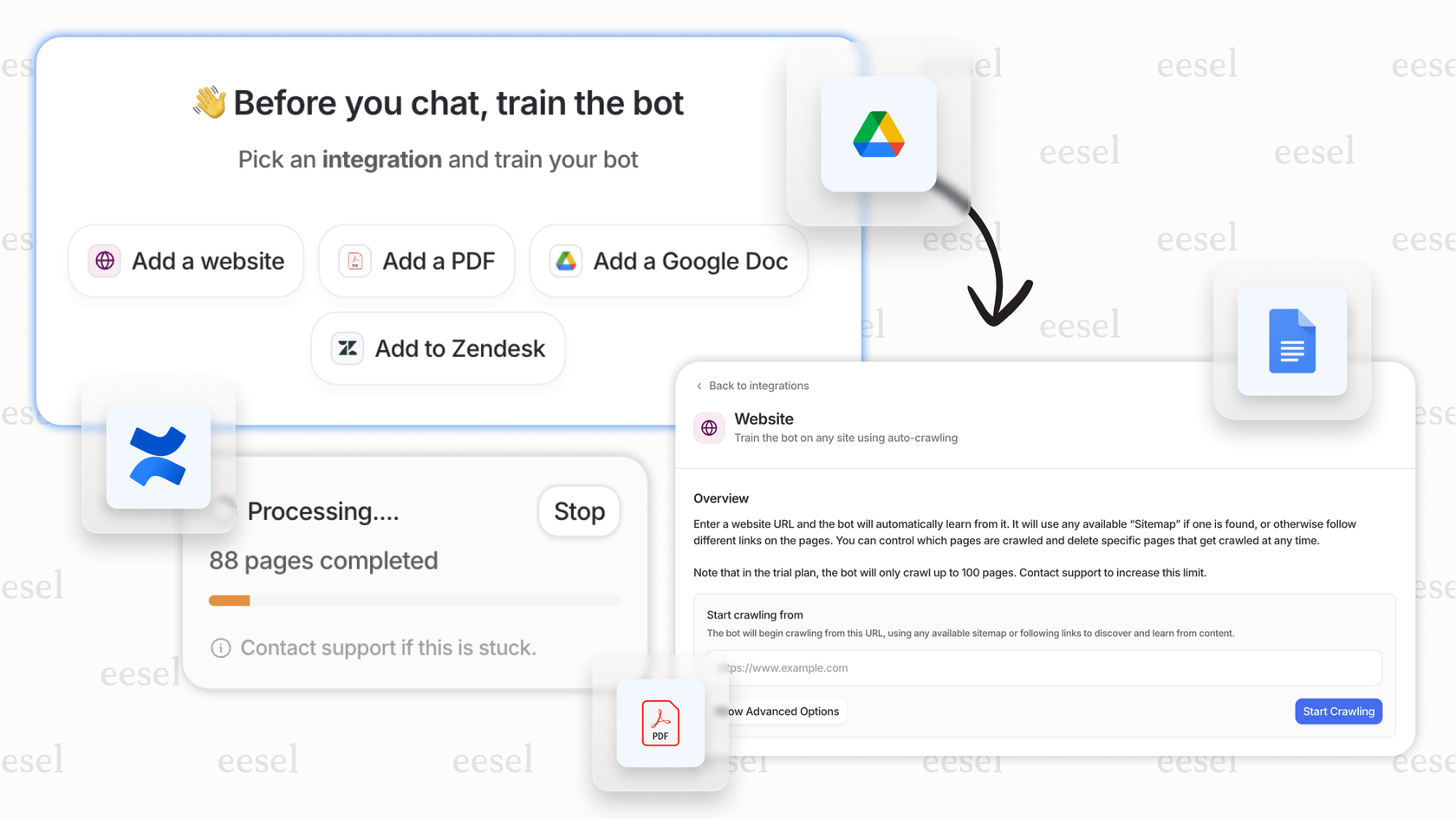
What really makes it stand out is how it layers on top of everything. It trains on your company's private information like old support tickets and internal documents to give answers that are spot-on and relevant to your business. It also has a "Simulate" feature that lets you test the AI on your past tickets before you turn it on for customers, so you can see exactly how well it will work from the get-go.
Pros:
- No migration needed. It plugs right into the software you already use, so your team doesn't have to learn a new system.
- Learns from your data. It studies past tickets, macros, and internal wikis to give answers that are super relevant and match your brand's voice.
- Different bots for different jobs. You can set up separate, specialized bots for Support, IT, and HR, each with its own knowledge and purpose.
- It takes action. It goes beyond just chatting to sort tickets, pull order data from Shopify, or automatically send an issue to the right team.
Cons:
- Because it's a full automation platform, it has more features to explore during setup compared to a basic, single-job chatbot.
Pricing:
- Team Plan: Starts at $239/month (billed annually) for up to 1,000 AI interactions and 3 bots.
- Business Plan: $639/month (billed annually) for unlimited bots, 3,000 interactions, and the ability to train on past tickets.
2. Zendesk AI
The Zendesk AI is built right into the Zendesk Suite, offering AI agents that are tightly connected to the Agent Workspace. It uses your Zendesk data macros, help articles, and tickets to automate chats and give agents helpful suggestions. As a mature and reliable platform, Zendesk provides an impressive ecosystem for businesses of all sizes.
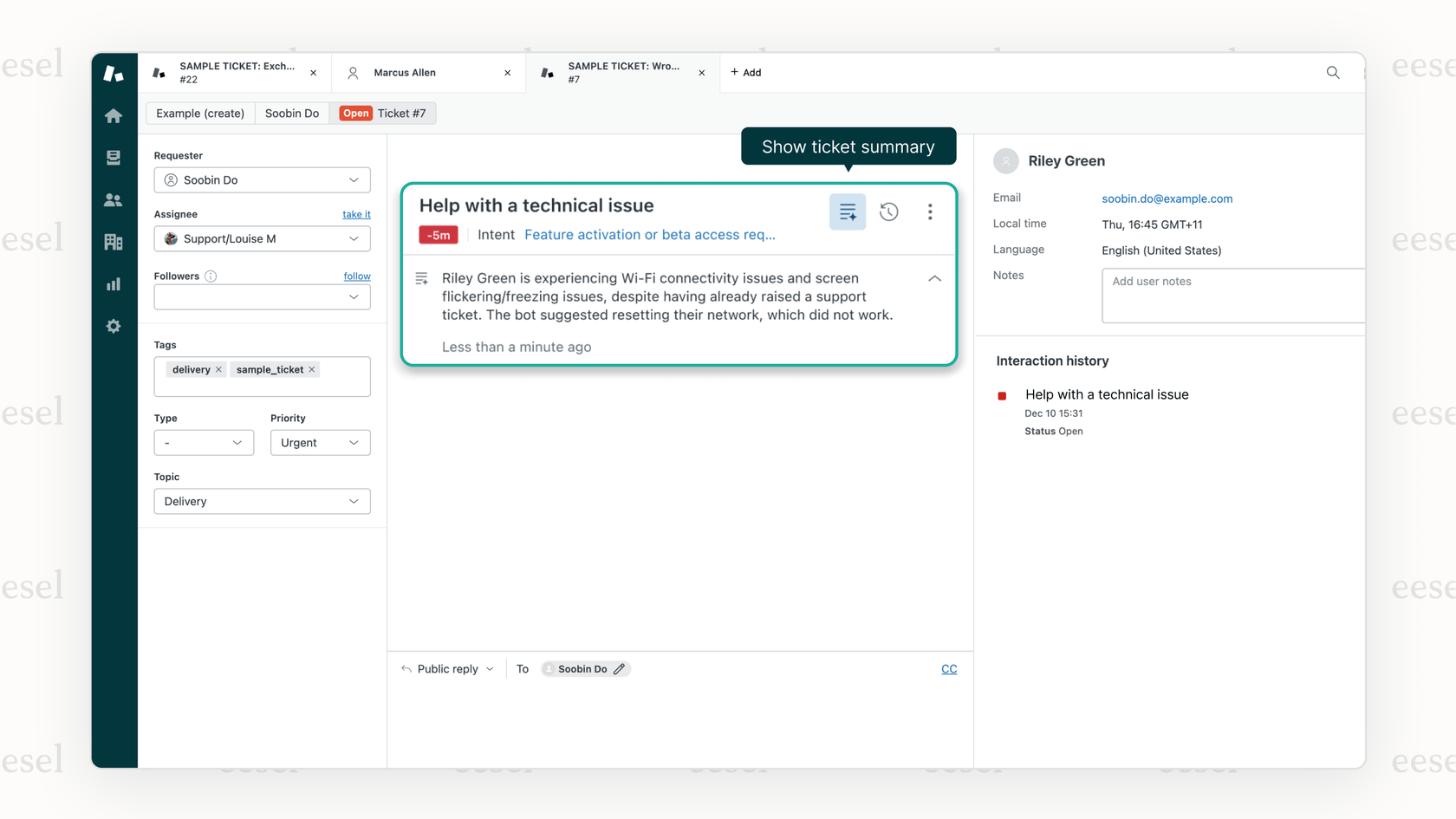
For teams that are already all-in on Zendesk, its built-in AI makes a lot of sense. The setup is straightforward, and the AI gets a big head start by having direct access to all your support data. Zendesk also offers tiered plans to match different team sizes, ensuring flexibility.
The complementary approach: Zendesk AI is optimized for the Zendesk environment. For teams that have knowledge spread out in other places like Confluence or Google Docs, a tool like eesel AI works perfectly alongside Zendesk to ensure your AI has access to the full story across every platform.
Pricing: AI tools are part of the Zendesk Suite plans, starting at $55/user/month (paid annually). Advanced AI capabilities can be added to further strengthen your support offering.
3. HubSpot chatbot
HubSpot’s chatbot builder is a highly capable tool that is particularly effective for driving sales and marketing success. It connects natively with the HubSpot Smart CRM to qualify leads, book meetings, and organize contacts. Its intuitive visual, no-code editor makes it easy for any team member to build out sophisticated conversation flows.
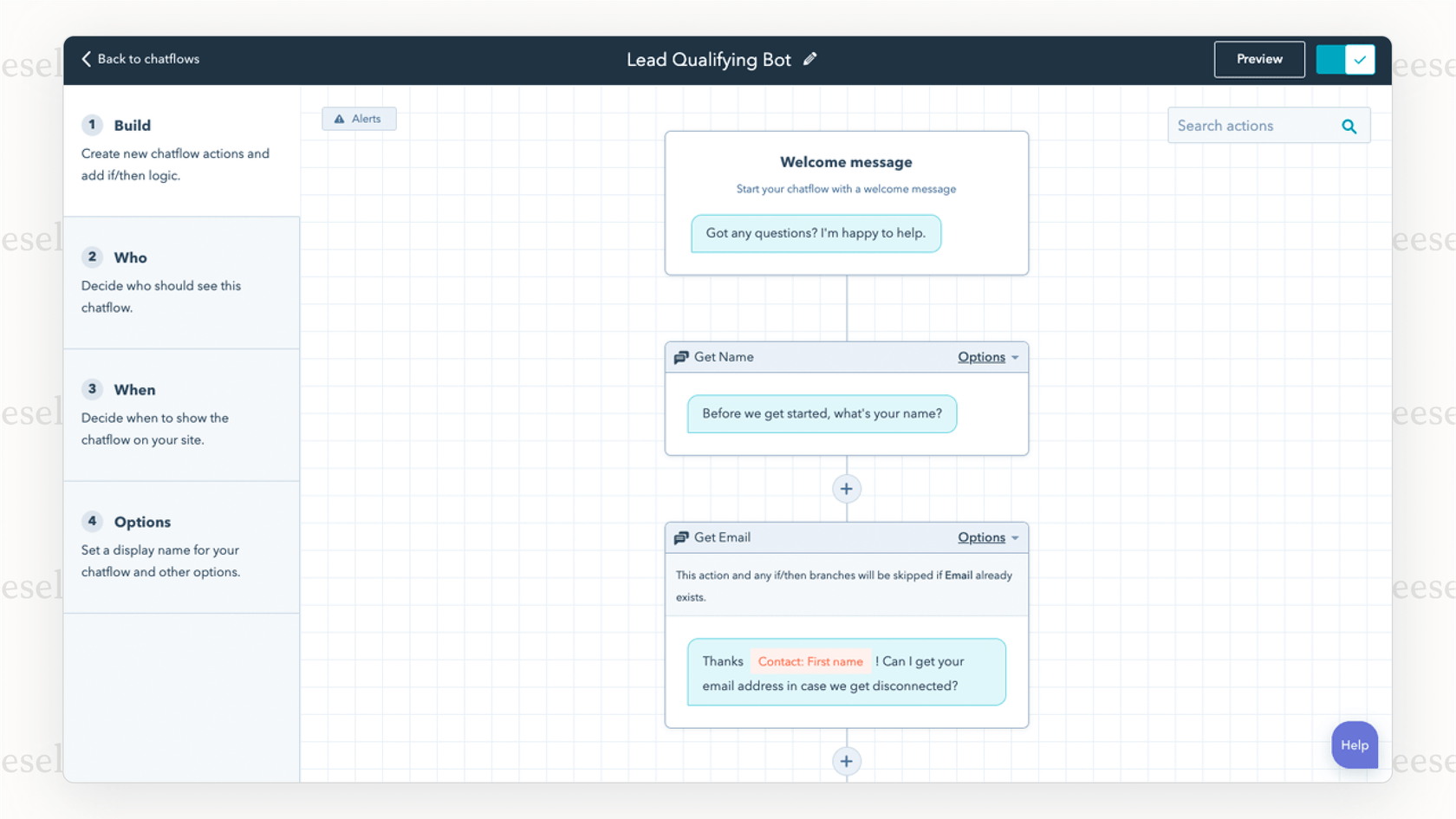
If your business uses HubSpot to power your marketing and sales, this chatbot is an excellent choice. It’s designed specifically to turn website engagement into new business growth.
The complementary approach: HubSpot's chatbot is a powerhouse for growth and CRM integration. For businesses that want to layer on specialized support ticket sorting or learn from deep historical data across multiple other helpdesks, a flexible tool like eesel AI can work alongside HubSpot to provide a truly comprehensive experience across the entire customer journey.
Pricing: HubSpot offers tiered plans starting with free tools, making it accessible for any budget. Professional features are available in hubs like the Marketing Hub, which match the needs of growing teams.
4. Claude
Claude, made by Anthropic, is a general-purpose AI that’s known for its ability to understand long documents and its strong reasoning skills. It's great for summarizing texts, writing creatively, and answering complicated questions. It's not a ready-to-go business platform, but developers can build it into custom tools.
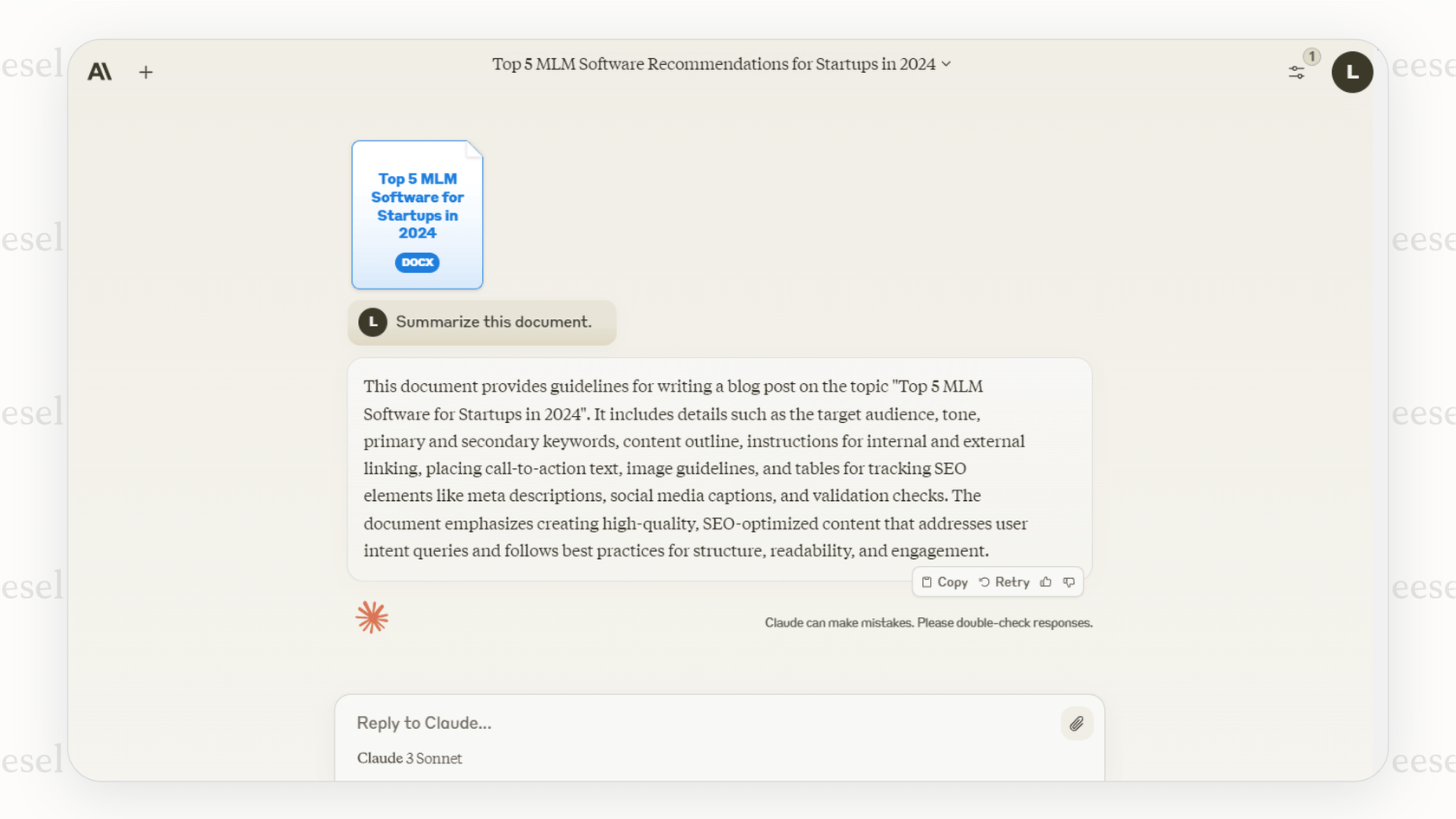
Claude's technology is seriously impressive and shows where language models are headed. It also has a strong focus on AI safety, which is a big plus for businesses thinking about ethics.
The catch? Claude is a foundational engine rather than a complete support solution. It doesn't come with the business-focused parts you need for support, like native integrations, agent-assist tools, or specialized security rules. Platforms like eesel AI take powerful models like Claude and wrap them in a business-ready package that has all those necessary controls and connections built-in.
Pricing: The free version has limits; the Pro plan is $20/month.
5. ChatGPT
We couldn't make a list of the best AI chatbots without mentioning ChatGPT. It's the tool that kicked off the current AI boom and is incredibly flexible for everything from writing code to analyzing data. You can customize it a bit with GPTs, but at its heart, it’s still a general-purpose tool.
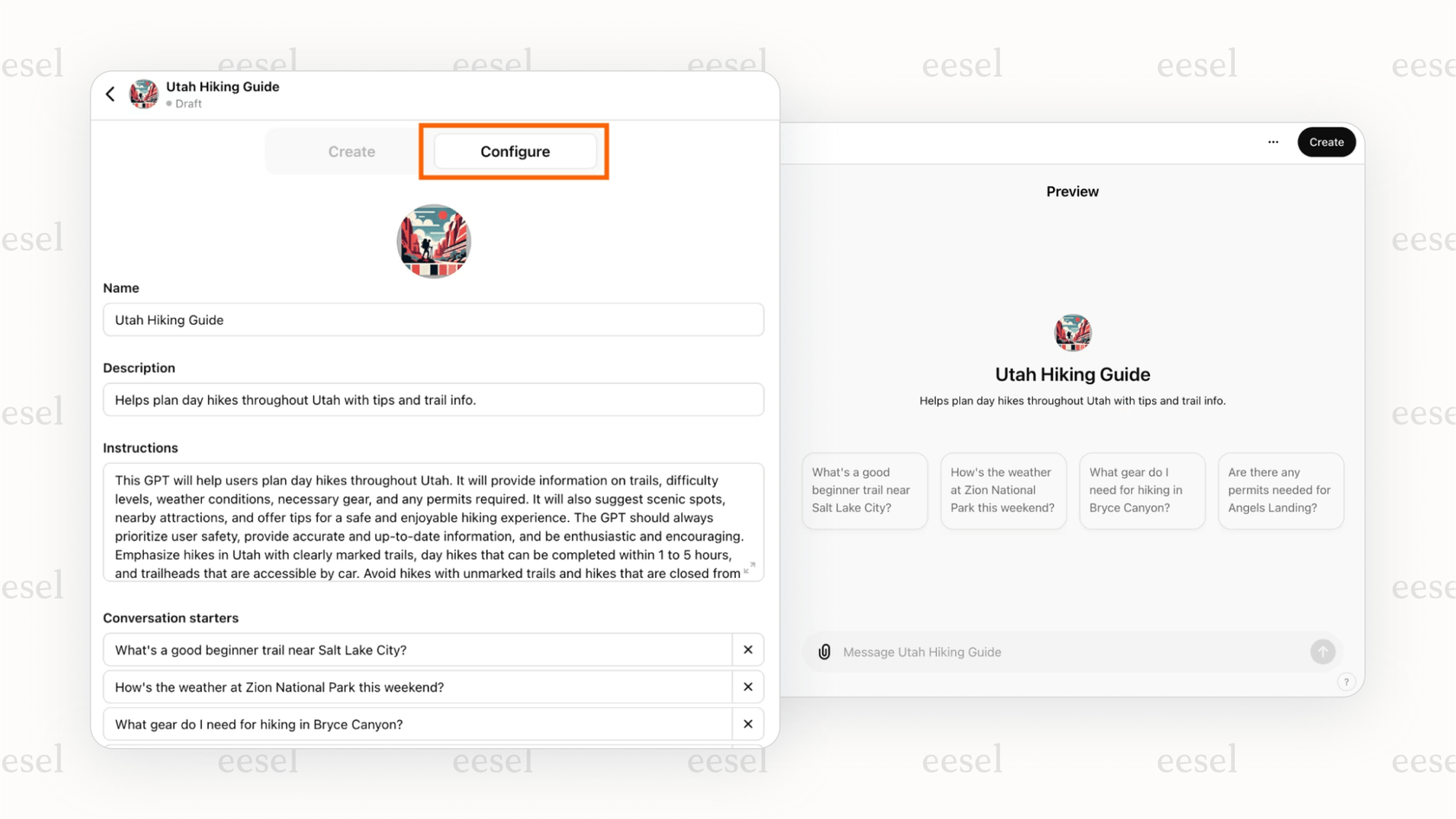
Its power and flexibility have set the bar for generative AI. It's a fantastic tool for an individual looking to brainstorm or get work done faster.
The catch? Like Claude, ChatGPT is a versatile general tool rather than a specialized support agent. To make it work safely and effectively in a customer service environment, you would typically use a platform like eesel AI which provides the necessary business structure and security to turn this powerful model into a reliable automated agent.
Pricing: There’s a free version available; the Plus plan is $20/month.
6. Tidio
Tidio is an all-in-one customer service platform designed mostly for small to medium-sized e-commerce companies. It bundles live chat with its AI chatbot, Lyro, and includes features meant to boost sales, like product suggestions and follow-ups for abandoned carts.
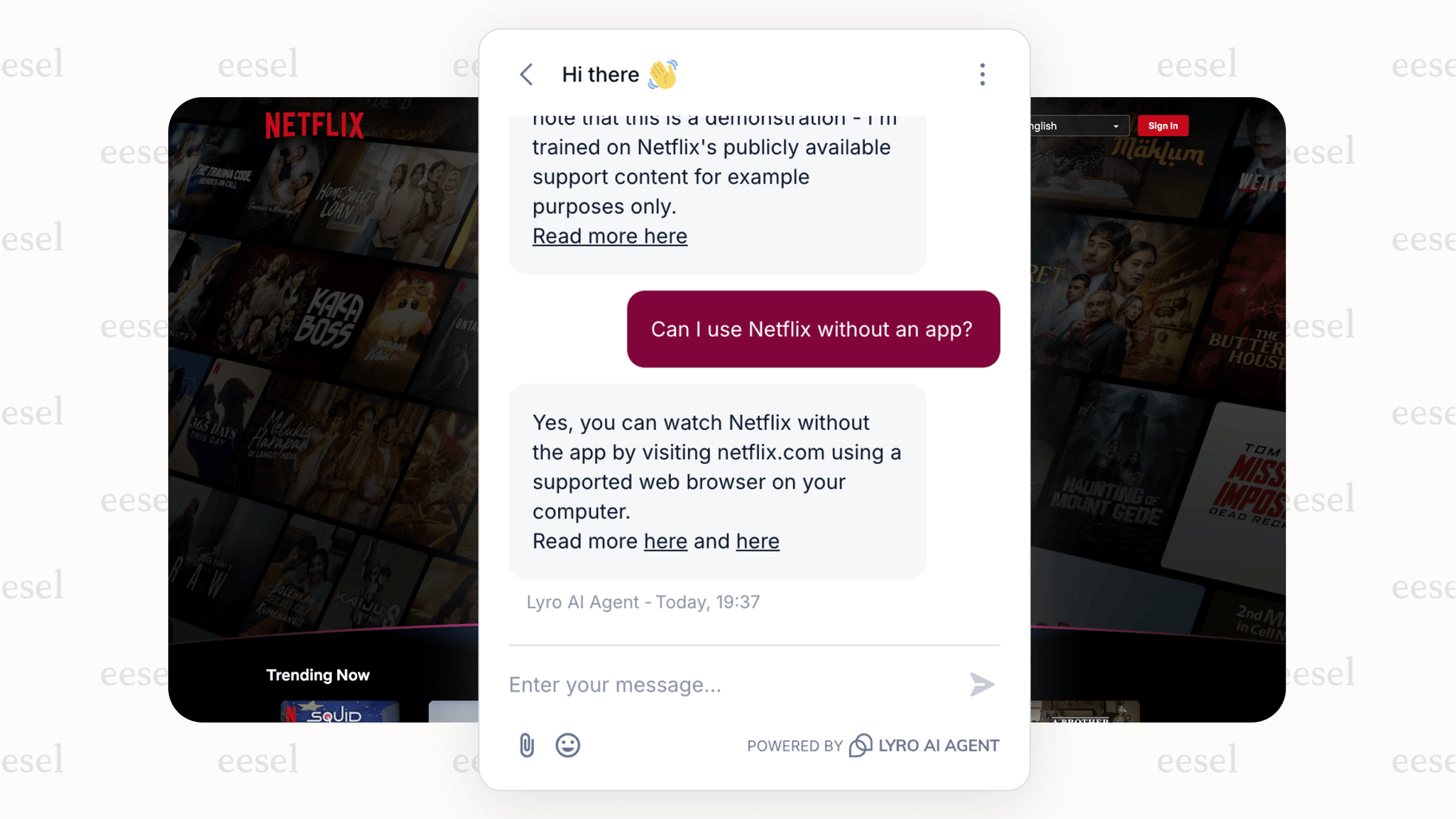
For online stores needing a simple way to handle customer chats and increase sales, Tidio is a good starting point.
The catch? Tidio is very focused on e-commerce. For businesses with complex internal support needs or those looking for an enterprise-grade helpdesk, a more robust and scalable platform like HubSpot or Zendesk would be better suited to handle both external customer service and internal employee support.
Pricing: Starts at $24.17/month, but you're billed separately for conversations handled by the Lyro AI.
How to choose the best AI chatbots for your business
Feeling a bit lost in all the options? Don't worry. Picking the right tool gets a lot easier if you ask yourself a few key questions.
- What problem are you trying to solve? Getting rid of common support questions is very different from finding sales leads or handling internal IT requests. Figure out your main goal first, and you'll quickly narrow down your choices.
- Improve or replace? This is the big one. Do you want an industry-leading, all-in-one platform that serves as your complete business hub (like HubSpot or Zendesk)? Or would you rather have a flexible AI layer that improves the tools you already have (like eesel AI)? Both paths offer great ways to modernize your setup.
- Where does your knowledge live? A bot is only as smart as the information it can access. Make sure the platform you choose can connect to all your knowledge sources, not just a public FAQ page. That includes internal wikis, spreadsheets, and past conversations.
- Test it out first. The best platforms let you try before you buy. Look for a tool with a sandbox or simulation mode. This lets you see how accurate it is with your own data before it ever talks to a real customer.
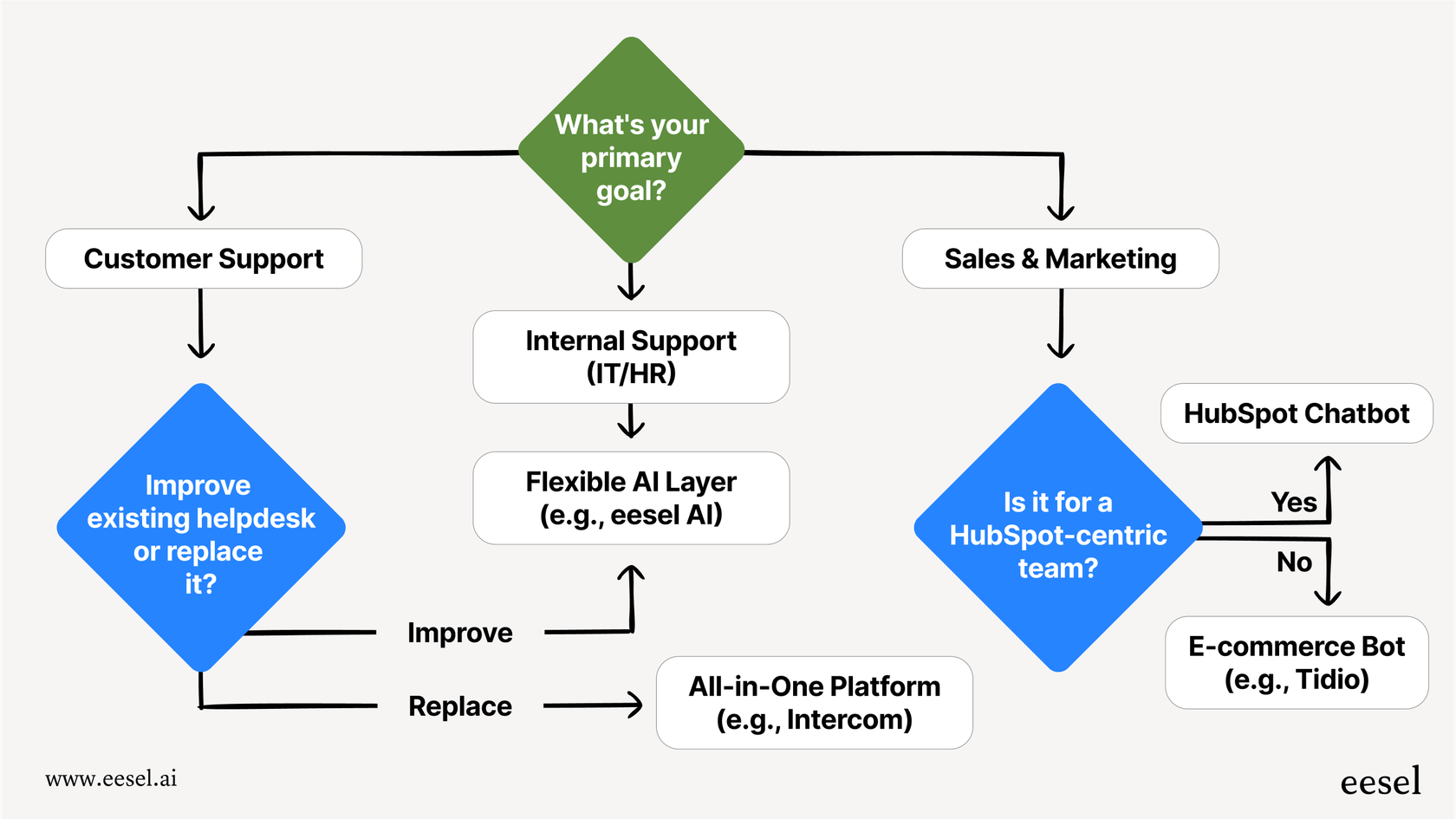
Which best AI chatbot will you use?
When it comes to the best AI chatbots in 2026, it all boils down to one thing: Finding a tool that works with your team, not against it. Mature platforms like HubSpot and Zendesk offer an incredibly robust and capable foundation for business growth and customer service, powering thousands of successful companies worldwide.
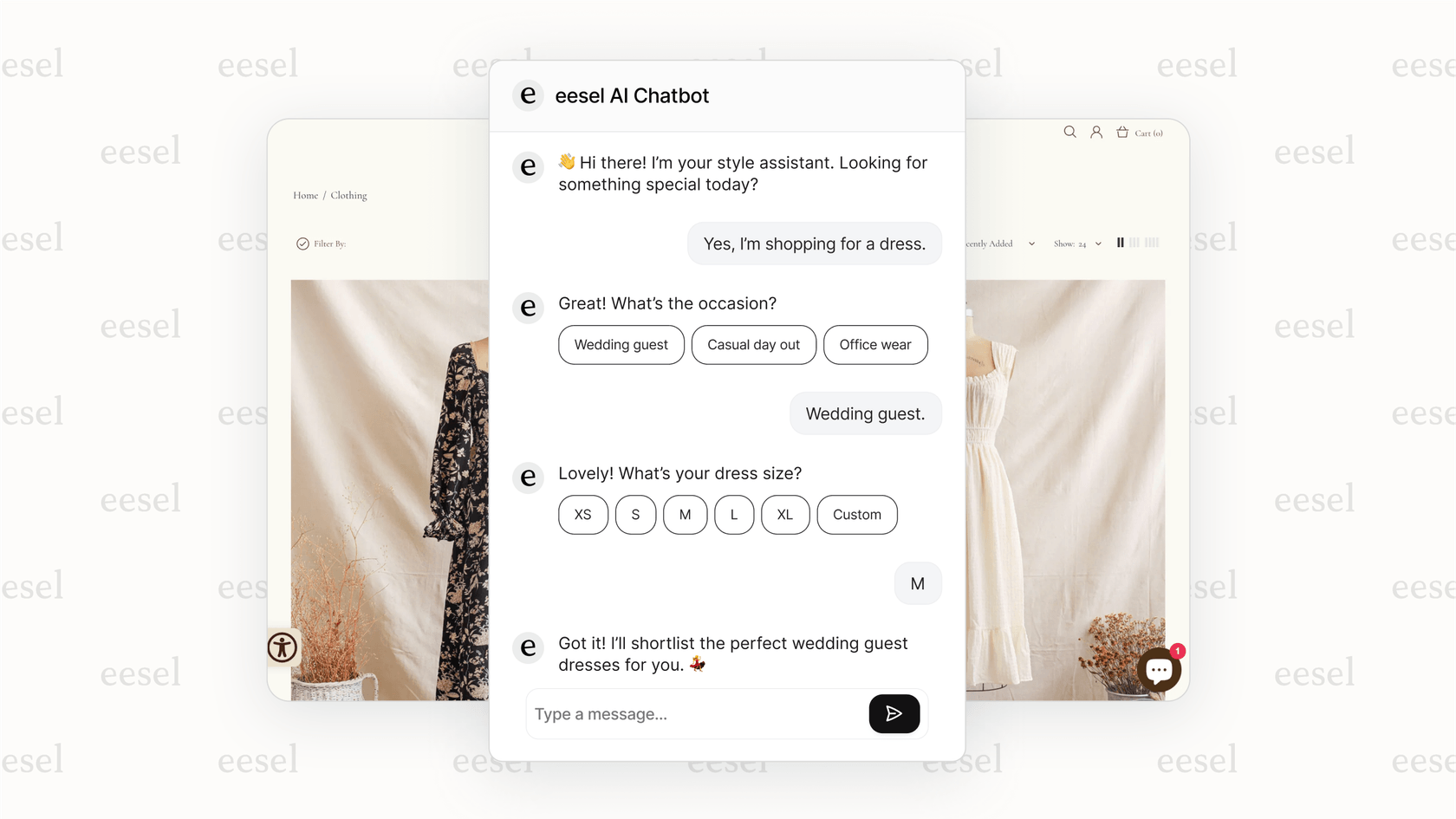
A smart strategy is to enhance the tools your team already knows and uses. eesel AI adds a powerful AI layer that plugs right into your current setup, delivering real value right away. It handles the repetitive work, so your team can focus on what they do best: Helping your customers and growing your business.
Ready to see how AI can work with your tools? Try eesel AI for free and build your first AI agent in just a few minutes.
Frequently asked questions
You don't necessarily have to switch. Some of the most effective solutions are designed as an AI layer that works on top of your current helpdesk and communication tools, which saves you from a painful migration and lets your team keep using the software they know.
Not at all. Most modern platforms are built for non-technical users and feature no-code builders that let you create and manage conversation flows with simple interfaces. This makes them accessible to your support or IT teams without needing any developer help.
Pricing varies widely, so there are definitely affordable options. While some all-in-one enterprise platforms can be costly, many modern tools offer scalable plans based on usage. This allows you to start small and ensure the cost makes sense as your business grows.
Reputable providers prioritize security with features like SOC 2 compliance, data encryption, and strict privacy policies. Always look for platforms that guarantee your data is kept private and is never used to train general AI models.
The key is to match the chatbot's features to your primary goal. A good sales bot will integrate with your CRM to qualify leads, while a top support bot will learn from your help center and past tickets to resolve issues. Some flexible platforms can even be configured for both roles.
Share this post

Article by
Kenneth Pangan
Writer and marketer for over ten years, Kenneth Pangan splits his time between history, politics, and art with plenty of interruptions from his dogs demanding attention.





